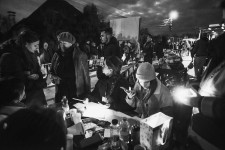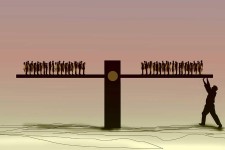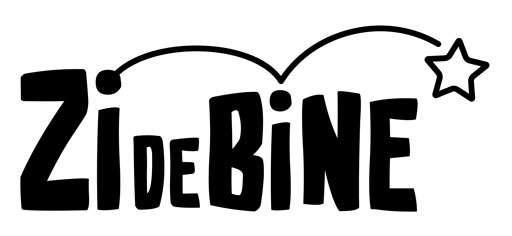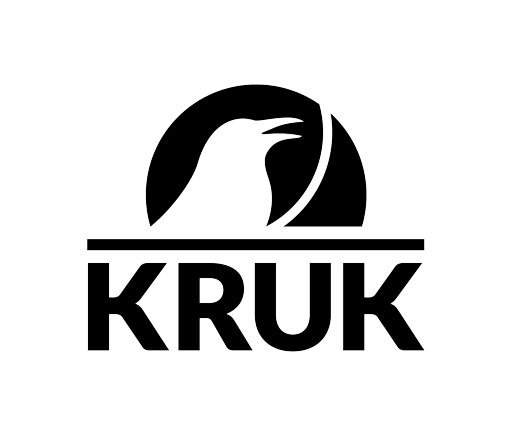De două ori pe săptămână, preț de două ore, IT-iști, oameni de afaceri, profesori și specialiști în asistență socială se aliniază în spatele tejghelelor de la magazinul social RoUa din Iași. “A-deen” (один), zice Ovidiu Biber, cel care în urmă cu câțiva ani organiza festivalul Afterhills, cu peste 100 000 de spectatori, arătând spre o conservă de ton. “Unu”, îi răspunde de pe partea cealaltă a tejghelei Evgheni, acceptând oferta raționalizată a magazinului, în timp ce se pregătește să așeze în coșul de cumpărături conserva de 40 de roua.
În jurul lor, în cortul în care donațiile pentru refugiații ucraineni se oferă sub forma unei experiențe de cumpărături, e forfotă mare. Din septembrie 2022, de când s-a deschis RoUa, a cărui funcționare este asigurată de echipa FONSS (Federația Organizațiilor Neguvernamentale pentru Servicii Sociale) și partenerii săi, Asociatia “Afterhills", ParentIS și Asociatia “Grupul Zâmbetul Nostru”, românii au început să învețe ucraineană, iar ucrainenii răspund, zâmbind, în română.
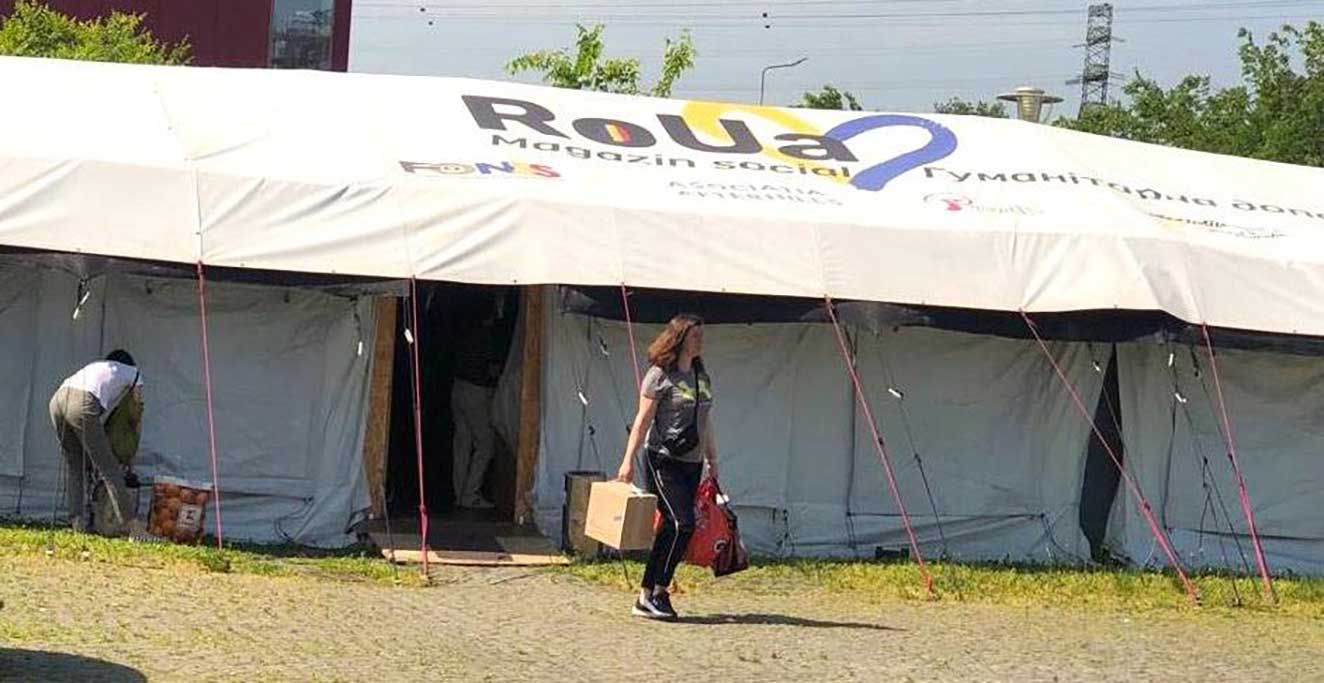
The minimum quota
"470 Ukrainians are invited to come shopping today. Not all of them show up, some are working, some are away, but more than half of them come every time," explains Mihaela Munteanu, the Refugee Centre's coordinator, in the white campaign tent, as she occasionally pushes me between the shelves to make room for the Ukrainians who enter the reception area.
They first pass by two offices as they enter the tent. Mihaela Munteanu explains how the social shop in Iași, available only to Ukrainians, works: "When they first come to the shop, a virtual account is set up for them, in a virtual currency called RoUa (n.r. roua means dew in romanian), like the shop. We calculated a minimum quota and tried to see how much RoUa they would need to survive for two weeks. We schedule them to come here every two weeks." In total, Ukrainian refugees receive 800 RoUa per month on a card.
Newcomers to the shop are first required to pass a paper check. "We ask for the original passports, because we don't want to be giving away for people from abroad. The second office is for social records. Basically, we assess their level of vulnerability, based on a predefined scale. And every time they come in, we check out the updates: Have you changed your address? Did you find a job? Did you send your kids to school? This builds confidence, that we keep track of them, that they're not just stranded somewhere in this world, and they also get information they need: If you want to send your kid to school, this is how it's done. Come to us in the Refugee Centre and we'll help you with your paperwork. It's the point of contact for them. And for evaluation. We kind of have a mirror of those who walk into the shop, how their condition has evolved, in terms of vulnerability."
It was a beautiful Sunday
Once this evaluation is completed, Ukrainian shoppers enter the second section of the tent, where food and hygiene products are arranged on one side and shoes on another. This is also where the fitting room is located.
"We tried to create an authentic shopping experience, with a shopping cart, a fitting room, display racks, so that they feel like they are shopping. We don't have a big shop, but we try to offer them the best we can," says the coordinator of the Humanitarian and Social Assistance Centre for Refugees CTR Nicolina, who further adds: "They are adults and they know how to spend their money. It's not like we invented currency and they were living in a wild world. They need a different experience. For people who come here, everything in their lives is unpredictable. Knowing the shop is here and that they can stock up on what they need twice a week is an element of predictability that also gives them psychological comfort. We designed this project from a social worker's perspective, it's not a business."
At Ovidiu's counter, the former event promoter, canned fish is in high demand. They cost 40 RoUa and each buyer only gets one, but hardly any Ukrainian passes through the tent without getting a can of tuna.
"We joined to provide a management flow, as we have experience from our projects of managing large inflows of people. It was a beautiful Sunday last year, and I've since stayed here, working on this project. We are emotionally tied to it as well. But what's important to know is that, as time goes by, people feel they really helped and somehow cross that off, in their minds. It's enough. But when you have to support such a long-term project, people should come back and help. It's not just about us, the Romanian community, the international community help is also needed. There are really moments when we don't have enough supplies to feed them," says Ovidiu Biber, as Ukrainians line up in front of him.
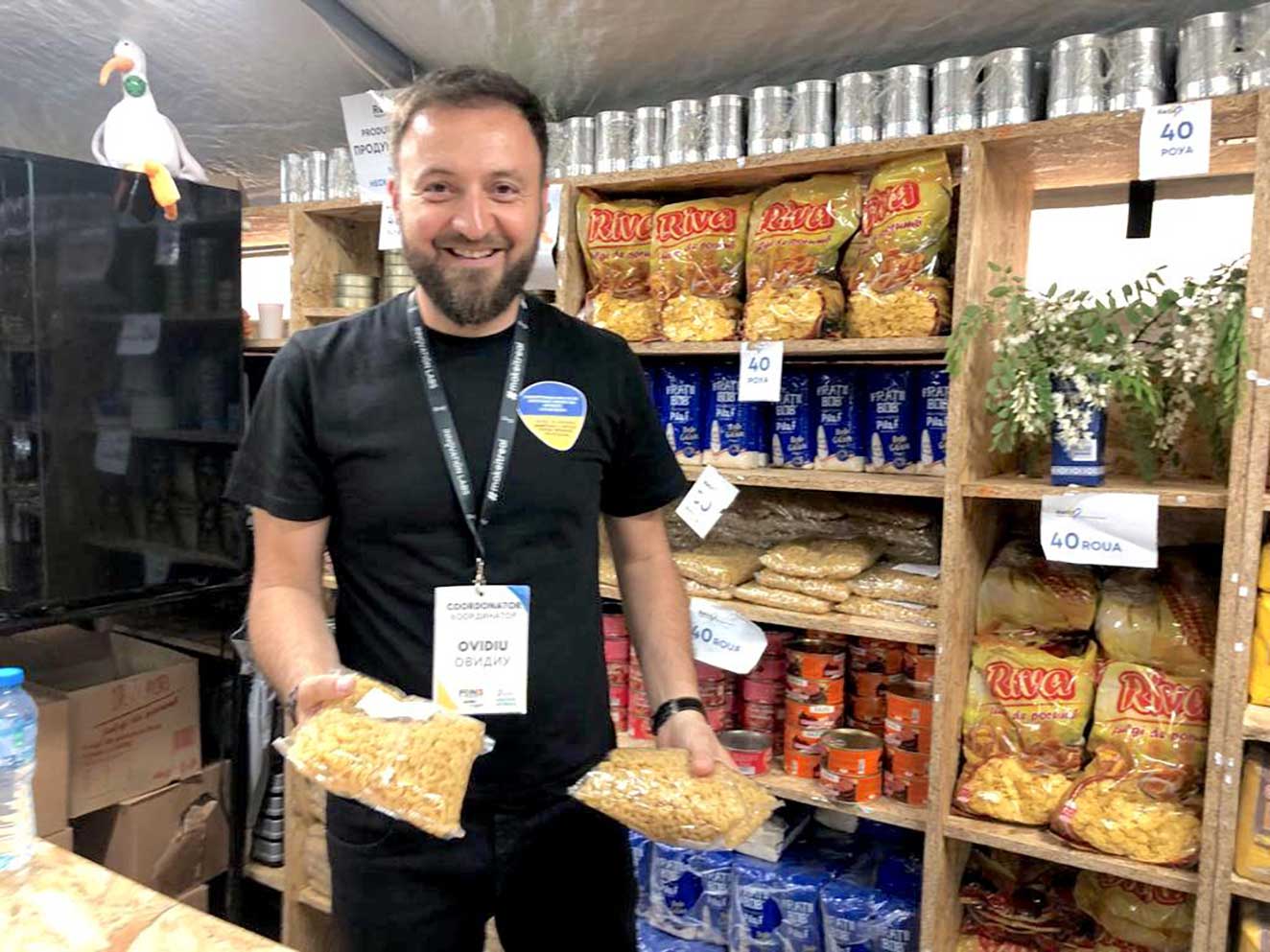
The nutrition counsellor
The third section of the shop is a children's section, with clothes priced at 15, 20 or 30 RoUa, as well as children's food. With a name seemingly predestined to bring her to Iași, Iulia Iasenchuk (pronounced Iashienciuk) already has a full basket. She arrived last year from Odessa. She's young, beautiful and recounts, in English, smiling, about her forced adjustment to life in exile: "I work every day and, apart from visits to the RoUa shop, I don't have many opportunities to talk to other Ukrainians. Except for the Ukrainian children I teach at Caritas. My kids are six and nine years old and they also attend classes at Caritas, but from September they will join a Romanian school. One of them is autistic, and today I bought him lactose-free coconut milk, canned tuna and crackers. My husband, brother and father are in Ukraine". What other kind of financial support would be useful for Ukrainians? "Maybe vouchers, so we can also buy from Lidl, Auchan. Or maybe vouchers for clothes," Iulia answers after a brief moment's thought.
In the children's section, only parents with minors in their care are allowed to stop. "If someone new comes in, who never came in before, they can get some emergency products for two weeks in the first month. But the next time they come in they are required to stop by the nutrition counsellor. We have a child nutrition counsellor stationed at the Centre. And we need to check if the traumatized mothers remember to feed their kids, if they are being over-protective and feed them too much, because these are normal tendencies in a trauma. They all come from a war zone, some women gave birth far from their homes, some have a different level of understanding and knowledge than they should, they never had the support of a family. So, in order to be able to fully support them, we enforce this rule for the benefit of the children", explains Mihaela Munteanu how, through shopping, the social workers from the Refugee Centre keep an eye on refugees' well-being while they are in Iași.
The fourth, and last, section of the RoUa Shop features additional products. There is also the "cash register" and the checkout. "By the time they get to the checkout, all the products are categorized, we total up the amount in RoUa, balanced against their virtual account, and if the products exceed the balance, they have to discard some. Next, we draft a delivery report for the products. Because, let's not forget, these are donations and we have to report to the funders what happened to the products they donated. However, it is still a distribution site for donations. It's just designed in a different format, that offers people dignity, and we try to offer them a real shopping experience, they're not just people asking for charity," explain the social workers.
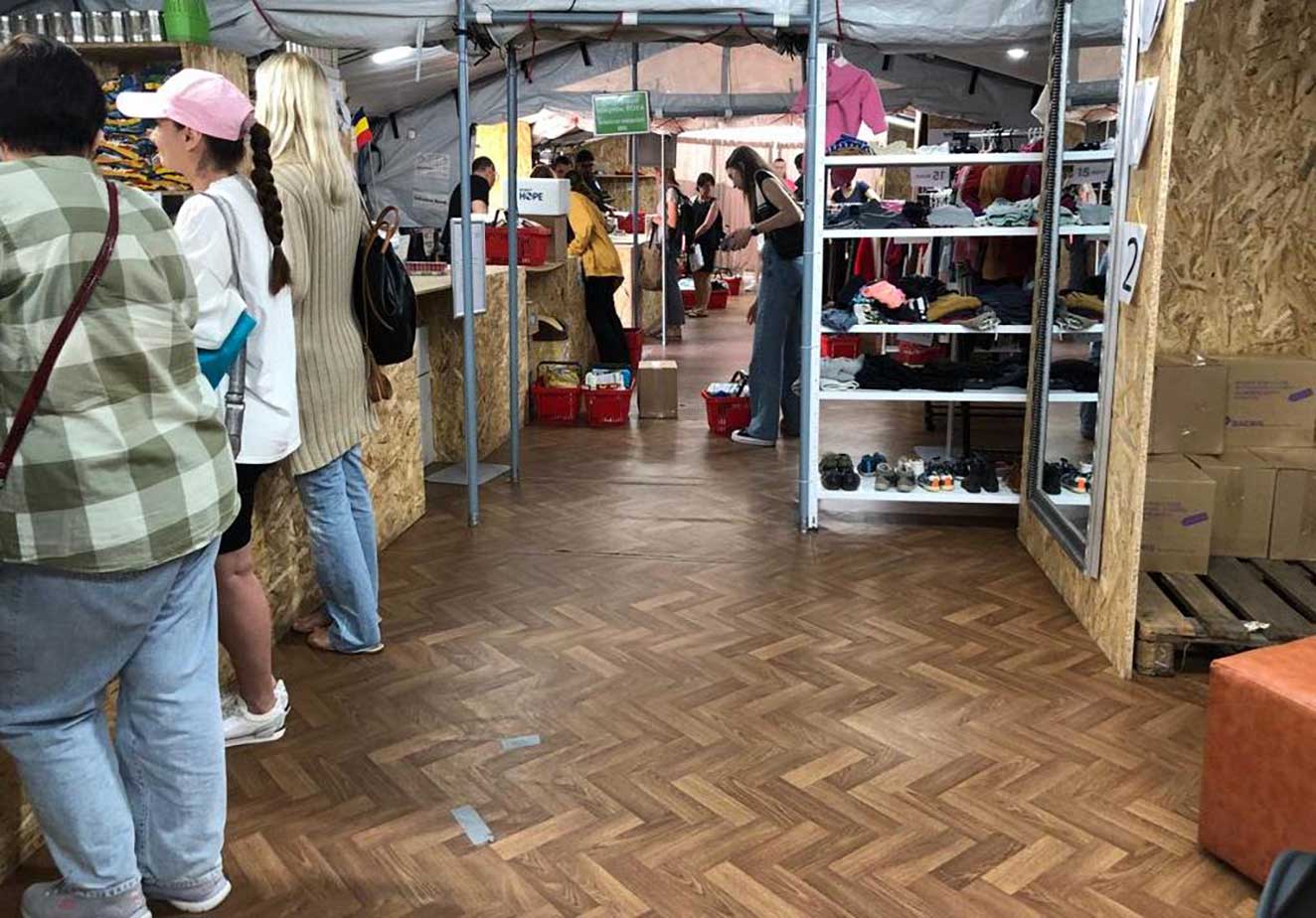
Iași, New York or Ukraine?
Marina (not her real name) just got to chekout. She's in her 60s, doesn't speak Romanian, but another Ukrainian woman from Chernivtsi is helping her as she sorts out her shopping basket: "Today I got sugar, cleaning products, shower gel... I found out about the shop from the Refugee Centre. Been here for a year and I return every two weeks."
At first, Alina Buhakova, a new arrival from Odessa last year, didn't know about the social shop. "I came to Iași in September and didn't know about the shop. But I'm learning Romanian here at the Centre and that's where I heard about it. Here we get everything we need, sugar, everything we require," says Alina, speaking Romanian fluently, half a year after she started learning the language.
"Most people learn Romanian, they seem to like it, they really want to learn it. Those who come from Chernivtsi already spoke it, the others are learning new words. And one can see them being active in the community, they don't only learn it from us, they go to the supermarkets, to petrol stations, you can actually witness their progress", confirms Ovidiu Biber from the non-perishable goods department.
However, Natasha decided not to learn Romanian. With the help of a translator, she declares herself satisfied with everything she was offered since her arrival in Romania. She came here with her husband, got pregnant, her husband went to work in New York, and she says she doesn't know yet if she will be giving birth to a child from Iași, a New Yorker, or if she will be in Ukraine by October 28, when she is due. " I don't think it will be New York, I want to stay close to my home," says Natasha, sitting on a chair next to the fitting room.
Alina, Natasha, Iulia, are just three of the 2,300 Ukrainians registered with the RoUa social shop. "Some moved on, they are no longer in Iași. Some are active, we know about them as they come here every two weeks. Others left and came back," says Mihaela Munteanu. The Romanians behind the social counters regret they cannot offer refugees fresh products: " Last summer we had fresh products, we had some money and we could buy from local farmers. Milk, cheese, vegetables, all very much needed. Everything sold like hot cakes. Now we no longer have the money to be able to afford it."
On February 24th, one year since the outbreak of the war in Ukraine and five months after the opening of the RoUa shop, 13,250 visits of Ukrainians were registered with the social shop in Iași.













